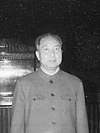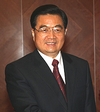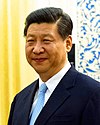User:PalaceGuard008/Paramount leader
 |
|---|
|
|
The paramount leader in modern Chinese history and politics is a term used to describe certain leaders of the Communist Party of China and government of the People's Republic of China. The most common application is to Deng Xiaoping during the late 1970s and the 1980s, who, without holding the highest posts of either party or government, was nevertheless acknowledged both within the Communist Party and by outside observers as the real paramount personality in China.
While China was ruled by strongman regimes in various periods of the 20th century, the first leader usually described as a "paramount leader" is Mao Zedong. From 1949, and especially from 1966 until his death in 1976, Mao was the unquestioned paramount leader of China.
Several years after Mao's death, Deng Xiaoping became acknowledged as the "paramount leader" of China. While Deng did not hold the highest posts or either party or government, he was the political leader of the Communist Party, and successive party leaders up to 1989 acknowledged that the party's protocol was that Deng was to be consulted on important matters of party and state. Deng formally retired in late 1989, and commentators differ on when his role as "paramount leader" should be regarded as having ended. On the one hand, Deng's influence in day-to-day government appear to have decreased after his retirement. On the other hand, he continued to exert occasional but important influence on the course of government policy, such as his 1992 southern tour.
Mao
[edit]Deng
[edit]Current situation
[edit]Events in 1989 triggered a change in Chinese constitutional convention. Whereas the 1982 Constitution envisaged central political power being distributed amongst several leaders, with the President being a symbolic figurehead, political conflict in 1989 caused a re-think among the leadership, which led in 1992 to a new convention whereby the leader of the party, the General Secretary, would concurrently serve as the head of the army and the head of state (the President).[1] (simplified Chinese: 中华人民共和国主席; traditional Chinese: 中華人民共和國主席; pinyin: Zhōnghuá rénmín gònghéguó zhǔxí. At the same time, decision making became a more collective process within the Politburo Standing Committee, with no single leader having the sort of paramount status enjoyed by Deng. As a result, while the three General Secretaries since 1989 (Jiang Zemin, Hu Jintao and the incumbent Xi Jinping) have occasionally been called "paramount leaders" in the press, their positions are of a different nature to that of Deng.
Certainly, after Deng the term has seldom been used since power is held more or less collectively by the members of the Politburo Standing Committee of the Communist Party of China with the General Secretary acting as a first among equals figure, and different factions jockeying for influence. Policy decisions are thought to be made via majority vote of Standing Committee members following internal discussions.[2] For example, though Jiang Zemin left the Standing Committee in 2002 and resigned all his posts in 2004, members of the Shanghai clique (of which Jiang is a member) retained a majority in the Standing Committee.
List of paramount leaders
[edit]To date, "paramount leader" has been applied to six individual Chinese leaders (dates approximate):

First administration Second administration Third administration Hu–Wen Administration Xi–Li Administration
| Picture | Name | Offices held | Period | Supreme rule | Ideology |
|---|---|---|---|---|---|
| Mao Zedong 毛泽东 (1893–1976) Beijing At-large (49-76)[clarification needed] |
Chairman of the CPC Central Politburo | 20 March 1943 – 28 September 1956 | 1 October 1949 ↓ 9 September 1976 (26 years, 344 days) |
Mao Zedong Thought | |
| Chairman of the CPC Central Secretariat | |||||
| Chairman of the CPC Central Committee | 19 June 1945 – 9 September 1976 | ||||
| Chairman of the PRC Central People's Government | 1 October 1949 – 27 September 1954 | ||||
| Chairman of the CPPCC National Committee | 9 October 1949 – 25 December 1954 | ||||
| Chairman of the CPC Central Military Commission | 8 September 1954 – 9 September 1976 | ||||
| Chairman of the PRC | 27 September 1954 – 27 April 1959 | ||||

|
Hua Guofeng 华国锋 (1921–2008) Hunan At-large (64–78) Beijing At-large (78–83)[clarification needed] |
Premier of the PRC State Council | 4 February 1976 – September 1980 | 9 September 1976 ↓ 22 December 1978 (2 years, 104 days) |
Two Whatevers |
| 1st Vice Chairman of the CPC Central Committee | 7 April 1976 – 7 October 1976 | ||||
| Chairman of the CPC Central Committee | 9 September 1976 – 22 December 1978 | ||||
| Chairman of the CPC Central Military Commission | 6 October 1976 – 28 June 1981 | ||||

|
Deng Xiaoping 邓小平 (1904–1997) Beijing At-large (59–64,78–83) PLA At-large (83–97)[clarification needed] |
1st Vice Premier of the PRC State Council | 17 January 1975 – 18 June 1983 | 22 December 1978 ↓ 12 October 1992 (13 years, 295 days) |
Deng Xiaoping Theory |
| Chairman of the CPPCC National Committee | 8 March 1978 – 17 June 1983 | ||||
| Chairman of the CPC Central Military Commission | 28 June 1981 – 9 November 1989 | ||||
| Chairman of the CPC Central Advisory Commission | 13 September 1982 – 2 November 1987 | ||||
| Chairman of the PRC Central Military Commission | 6 June 1983 – 19 March 1990 | ||||

|
Jiang Zemin 江泽民 (1926–) Shanghai At-large (88–08)[clarification needed] |
General Secretary of the CPC Central Committee | 24 June 1989 – 25 November 2002 | 12 October 1992 ↓ 19 September 2004 (11 years, 343 days) |
Three Represents |
| Chairman of the CPC Central Military Commission | 9 November 1989 – 19 September 2004 | ||||
| Chairman of the PRC Central Military Commission | 19 March 1990 – 13 March 2005 | ||||
| President of the PRC | 27 March 1993 – 15 March 2003 | ||||

|
Hu Jintao 胡锦涛 (1942–) Guizhou At-large (88–93,98–03) Tibet At-large (93–98,03–08) Zhejiang At-large (08–present)[clarification needed] |
General Secretary of the CPC Central Committee | 15 November 2002 – 15 November 2012 | 19 September 2004 ↓ 15 November 2012 (8 years, 57 days) |
Scientific Development Concept |
| President of the PRC | 15 March 2003 – 14 March 2013 | ||||
| Chairman of the CPC Central Military Commission | 19 September 2004 – 15 November 2012 | ||||
| Chairman of the PRC Central Military Commission | 13 March 2005 – 14 March 2013 | ||||

|
Xi Jinping 习近平 (1953–) Fujian At-large (98–03) Zhejiang At-large (03–08) Shanghai At-large (08–present)[clarification needed] |
General Secretary of the CPC Central Committee | 15 November 2012 – Incumbent | 15 November 2012 ↓ Incumbent (12 years, 7 days) |
Chinese Dream |
| Chairman of the CPC Central Military Commission | |||||
| President of the PRC | 14 March 2013 – Incumbent | ||||
| Chairman of the PRC Central Military Commission |
See also
[edit]- List of leaders of the Communist Party of China
- Chairman of the Central Military Commission
- Political position ranking of PRC
- List of Chinese leaders
- Supreme Leader (disambiguation)
- Maximum Leader
